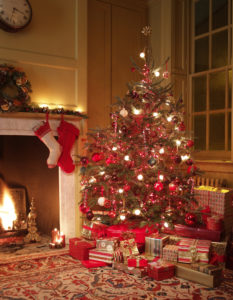
With the winter months come a collection of holidays such as Advent, Christmas Day and Epiphany. However, many of their beloved Christmas traditions in the West have decidedly pre-Christian origins. From the December 25 date to the Christmas tree to the practice of exchanging gifts, our beloved cold season celebrations owe some of their splendor to our pre-Christian ancestors.
December 25, Saturnalia and the Yule Log
Although the Christian world typically observes the birth of Jesus Christ on December 25, there is nothing in the Bible that indicates the reason why this date was selected. Aside from the arguments over whether Jesus actually existed, there are also doubts that his parents’ journey to Bethlehem would have taken place during the winter at all. A December 2015 Time article revealed that scholars point to the Gospels’ depiction of shepherds on the field, along with the improbability of a pregnant woman making what would have been a 70-mile trek in the middle of winter, as clues that a Biblical Jesus would not have been born on December 25.
Multiple sources suggest that the December 25 date has a more pagan origin. A History Channel write-up mentioned ancient Germanic celebrations of Yule, a midwinter festival with connections to the Norse god Odin. Yule typically started with the winter solstice on December 21 and ended around 12 days later. It was a time during which Yule logs were burned, many livestock were slaughtered, and large quantities of alcohol were produced, which naturally led to merrymaking. Some also point to the Roman tradition of Saturnalia, time of merrymaking in late December and early January during which class-based social norms were turned upside down. Moreover, ancient Romans observed the birth of Mithras, originally an Iranian sun god, around December 25.
O Christmas Tree, O Christmas Tree?
Patheos columnist Jason Mankey suggests that the history behind our beloved Christmas tree may be more complex than previously thought. He disclosed that the use of evergreen branches for indoor decoration originates from ancient Greek and Roman times, with some associations between these plants and the mysterious deity Dionysus. A History Channel article corroborates the existence of pre-Christian usage of evergreen boughs for inside décor, including by ancient Celtic priests for their temples. Meanwhile, Vikings also revered them and believed they were sacred to their sun god Baldur.
Mankey also mentions that the modern version of the Christmas tree first appeared in Germany during the 1500s. The History Channel further explains that while it was a custom unique to German immigrants in America, its acceptance in the United States was slow due to many viewing it as a strictly pagan symbol. Once Queen Victoria adopted the practice of tree-trimming for the British royal household in 1846, the Tannenbaum Christmas traditions began to take root both in the United Kingdom and here in the States.
Gift-Giving During Saturnalia
Gifting our friends and family has long been one of the seasonal Christmas traditions , but this practice can be traced back to the ancient Romans. In the Patheos article mentioned earlier, Mankey details that presents of many kinds, including toys and food, were exchanged during Saturnalia season. It also took Queen Victoria to popularize this tradition in the English-speaking world, adopting it for the royal family in 1900.
Blended Customs in the Modern World
While many of us take our present-day holiday celebrations for granted, some have shunned them because of their pagan roots. History documents that English statesman Oliver Cromwell cancelled Christmas during his rulership, and the original American Puritans even outlawed its observance. Even today, some fundamentalists eschew it for its pre-Christian traditions, citing Biblical commands to abstain from pagan practices. Nevertheless, millions of people give little thought to the origins of these customs and continue to deck their halls, sing carols, exchange gifts and enjoy spending time with their families.

